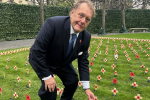Cancer still blights too many lives. It is Certainly, the fear of childhood cancer chills. Yet, sadly, 1 in every 500 children under 15 develops a cancer. When people aged under 24 are included, there are 3,800 children and young adults in Britain are diagnosed with cancer each year.
September is Childhood Cancer Awareness Month, which sees a number of charities including Cancer Research UK, Children’s Cancer and Leukaemia Group and Children with Cancer UK partnering to raise funds for, and awareness of, this tragic set of conditions affecting our youngest and most vulnerable.
Though we often associate the risk and reality of cancer with ageing, the fact is that it also affects some people at the very start of their lives and, crucially, it is often harder to detect in younger people. Childhood cancers tend to occur in different parts of the body to those affecting adults, as well as often having a distinctive appearance when studied and responding particularly to treatments. The causes of childhood cancer continue to be studied, with research being conducted to establish genetic predispositions. As we learn more, tailored treatments are being perfected.
There are at least 35,000 young people in the UK who have been diagnosed with a childhood cancer and survived more than five years, and the cure rates for children are now much higher than for most adult cancers. It is hugely welcome news that the survival rate for children’s cancer has more than doubled since the 1960s - over 8 in 10 (82%) of sufferers are now cured, compared with fewer than 3 in 10 back then. For some types of children’s cancer, the cure rate is even higher.
Whilst childhood variants account for less than 1% of all cancers in the UK, the number is still far too high. Which is why I have asked the Health Secretary what steps are being taken to raise awareness of childhood cancers. In younger people whose bodies are changing, cancers can be harder to detect as they mature in particular ways. Specialists continue to do important work to provide the best treatments for all children with cancer, but there will always be more to do. The increased associated costs for families caring for loved ones is an issue I have raised previously and will again.
This September, you can join me in supporting Childhood Cancer Awareness Month by purchasing and wearing a gold ribbon from an associated charity. Other ways to help include donating money for research, treatment, and specialist carers for those affected, or even by simply performing a hundred step-ups per day and publicising your achievement to back the Awareness Month.
We can all play a part in the battle against cancer, knowing that regardless of the hand people are dealt in life, that the understanding of risks that such awareness campaigns bring significantly improve the chances of overcoming even the highest of hurdles.
